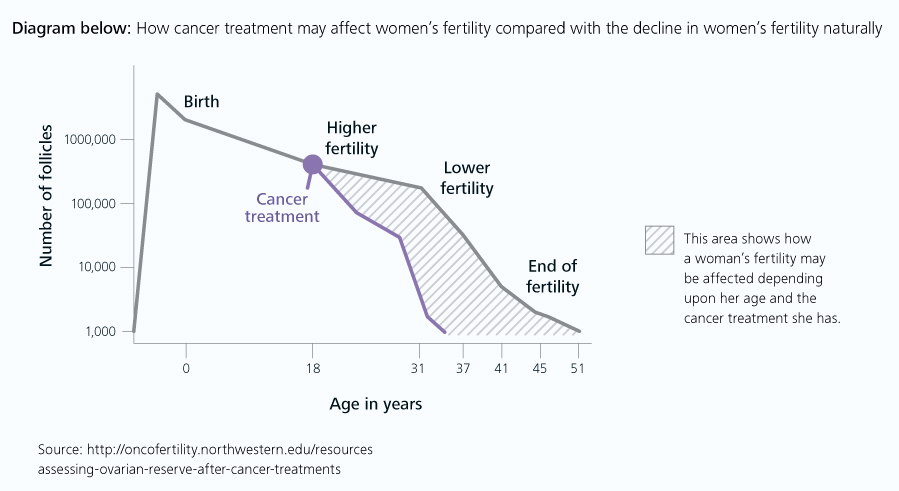How cancer treatments affect fertility
The chance a woman gets a fertility problem from her cancer treatment depends on many things.
These include her age, fertility and health before cancer, the type of cancer and the type of cancer treatment she has.
Because of the many things that can affect fertility, it is difficult to know for sure how a woman’s fertility will be affected. Not all women that have cancer treatment will have a fertility problem in the future. It is difficult to know if the fertility problem will be long-lasting until after cancer treatment has been completed. We also cannot know for sure how long a woman will be fertile after cancer treatment.
For these reasons you may wish to talk about your chance of future fertility problems with your cancer care team and fertility care team before you begin your cancer treatment.
Both the cancer care team and fertility care team talk with women about their cancer type, cancer treatment and personal history. They try and work out how the cancer treatment may impact upon their fertility.
The main types of cancer treatments are chemotherapy, radiotherapy, surgery, hormonal therapy and targeted therapy and they all work in different ways. You will need to ask your cancer care team about what the chances of infertility are with each cancer treatment option you are offered.
The graph below shows how cancer treatment can affect fertility. It shows how the number of eggs a woman has (her ovarian reserve) may be lowered after cancer treatment. The shaded area on the graph shows that a woman’s fertility can be affected depending upon her age and the cancer treatment she has been given.
Fertility in women may fall anywhere within the shaded area. Talk to your cancer care team to find out more about how cancer treatment and your age may affect fertility for you.

During your cancer treatment, you may find that your periods stop or become irregular. These changes can be temporary or permanent.
Temporary: If the changes to the menstrual cycle are temporary then your periods will come back after cancer treatment. This could happen within a few months or may take up to a year or more. The younger you are when having chemotherapy treatment, and if you are under 35, the more likely it is that your periods will return. The number of years you are fertile might be lower. Even if your periods come back, this does not always mean you will be able to get pregnant.
Permanent: If the changes to the menstrual cycle are permanent this means your periods will not come back after cancer treatment, and the menopause starts. Women over 35 years old are more likely to be infertile after their cancer treatment.
If your periods stop during cancer treatment, you could still get pregnant. However, you are strongly advised not to.










